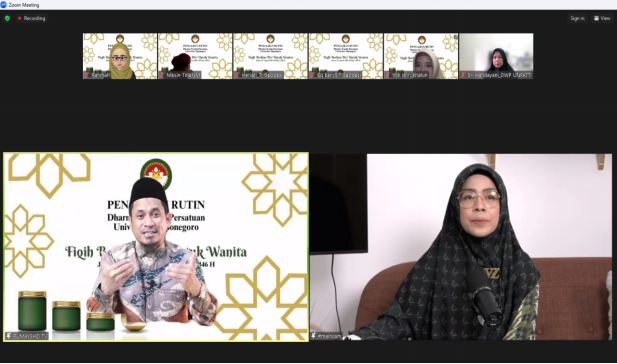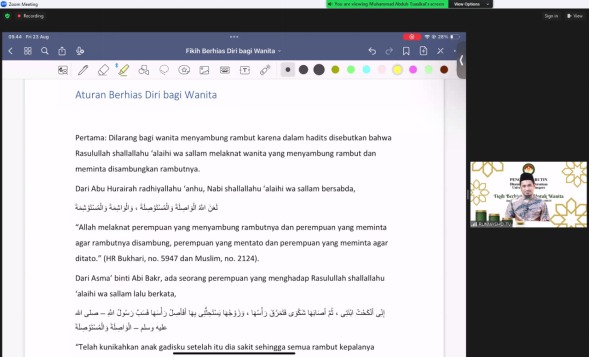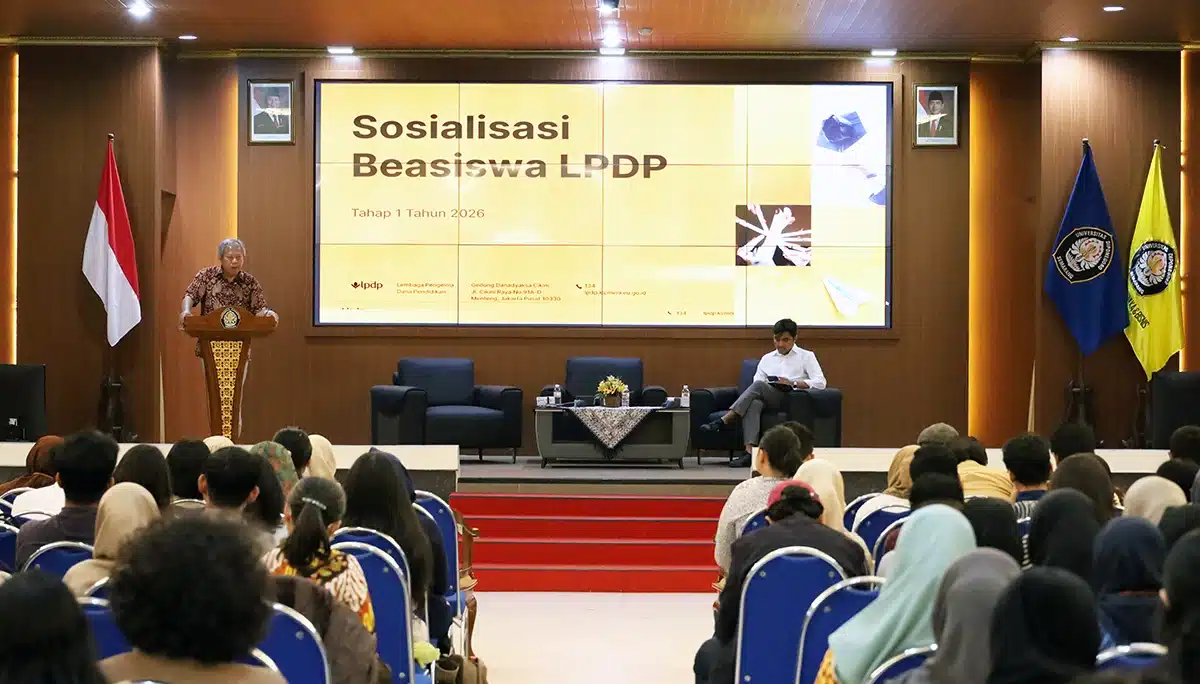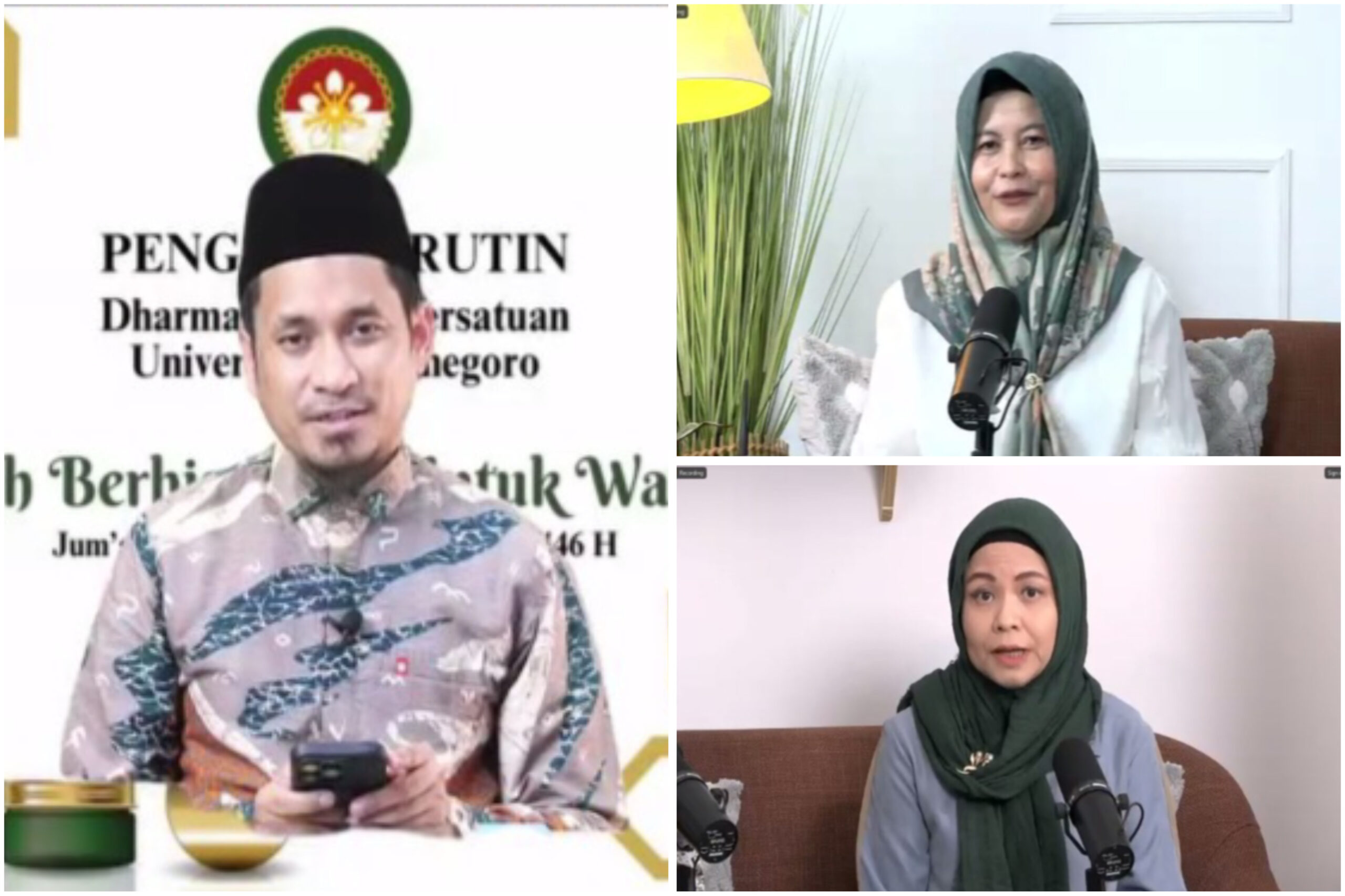The Dharma Wanita Persatuan (DWP) of Diponegoro University held a regular study session titled “Fiqh of Beautifying Oneself for Women,” which was attended by 151 participants online via Zoom on Friday (23/8). DWP of the Faculty of Medicine (FK) UNDIP, as the host, invited Ustadz KH. Dr. Muhammad Abduh Tuasikal, S.T., M.Sc. (Leader & Caretaker of Ponpes Darush Sholihin Yogyakarta; CEO of Rumaysho.com), as the speaker for the religious lecture.
In her opening remarks as Chairwoman of DWP UNDIP, Dewi Suharnomo stated that beauty is a necessity both inwardly and outwardly. Inner beauty (behavior, morals, ethics, knowledge, etc.) and outer beauty (appearance, attitude, conduct, speech) must be supported by many factors. While beautifying oneself is obligatory, Islam has guidelines in accordance with the Quran and Hadith. “I hope the knowledge about the fiqh of beautifying oneself shared by the Ustadz will be beneficial for all of us and can be applied in our daily lives,” said Dewi.
Yetty Yan Wisnu, Chairwoman of DWP FK UNDIP, as the host, stated in her speech that beautifying or enhancing oneself is something inseparable from women. By beautifying themselves, women usually feel more confident, and it is also a form of gratitude for what Allah has given them. “However, Islam also teaches how a Muslim woman should beautify herself. Therefore, we can increase our knowledge on beautifying oneself according to Islamic teachings, and I hope it will be beneficial for all of us,” said Yetty.
During his lecture, Ustadz KH. Dr. Muhammad Abduh Tuasikal, S.T., M.Sc. explained that during the time of the Prophet Muhammad (peace be upon him), the best women had three qualities: they pleased their husbands when seen, obeyed their husbands when commanded, and did not disobey their husbands in matters of themselves and their wealth, which could make their husbands upset or angry.
“Discussing the best women, they are those who please their husbands by beautifying themselves or dressing up, especially when at home. Islam also warns women, as well as advises husbands/men, to protect their wives and daughters when beautifying themselves outside the home due to the extraordinary temptations associated with women,” he explained.
Based on Surah Ali Imran: 14, it is stated that the love for worldly adornments, especially women as the foremost adornment of the world, has been made attractive to people. Furthermore, Surah An-Nissa: 27 mentions that humans are weak mainly due to the temptation of women. Similarly, the temptation of women is considered the most severe (Narrated by Bukhari No. 5096 and Muslim No. 2740).
“In Surah An-Nur verse 31, it is mentioned not to display one’s adornments except that which is normally apparent. This verse serves as the basis for the types of adornments that should not be displayed, such as kohl, henna, and jewelry. In contrast, the adornments that can be shown include outer garments that do not reveal the body’s shape, as well as the face and hands, which are used for daily purposes,” he added.
Women’s adornments, such as necklaces, bracelets, rings, as well as cosmetics and powder on their faces, should only be shown to their husbands; their fathers and grandfathers; fathers-in-law and their ancestors; their sons or stepsons; their brothers (full, half, or step); the sons of their brothers or sisters (nephews); Muslim women (some scholars allow this for all women, including non-Muslim women); female servants; men who are not attracted to women and no longer have desires; and other children who have not yet reached the age of discernment (who cannot distinguish right from wrong).
“As for the expenses for beautifying oneself, it should be according to the husband’s ability, not the wife’s needs. The statement is based on Surah Ath-Thalaq: 7. The maintenance provided by the husband to his wife (food, clothing, and shelter) includes food, side dishes, clothing, cleaning tools, eating utensils, housing, furniture, air conditioners or coolers, and servants if needed, according to his ability. Regarding hygiene tools, a wife is entitled to maintenance from her husband, such as a comb, hair oil, soap, and others. As for perfumes, kohl, and jewelry, they are the husband’s right (it is not the husband’s obligation to provide them), but if the husband buys these items, the wife is obliged to use them,” said Ustadz Abduh.
“Furthermore, the command to wear the proper hijab for women includes 12 conditions for women’s clothing, one of which is to cover the ‘awrah and not to wear revealing clothing. The rules of beautifying oneself for women include the prohibition of hair extensions, the prohibition of plucking or removing eyebrows and eyelashes, and the prohibition of tattoos. It is permissible to wear henna on the hands and feet and to color the nails on the condition that they are not visible outside. It is also permissible to dye hair for those who have gray hair but avoid using black dye; it is also allowed to wear gold and silver jewelry according to custom, but it should not be displayed to men,” he explained.
The DWP UNDIP study session continued with a Q&A session. The participants eagerly asked the speaker questions, both directly and in writing. The Q&A session was conducted interactively and orderly, followed by a closing prayer. (DHW-Public Relations)











